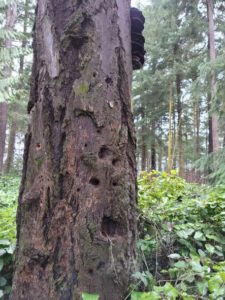“In every walk with nature one receives far more than he seeks” John Muir
The sunny weather this week has created many opportunities to be outdoors and take walks in nature. On one such adventure I came across the above quote. It was not until my second glance at the sign that I realized the choice of preposition, with. It was at this point that I thought that Muir must have understood what Edwin H. Friedman meant by a self-differentiated leader or person.[1] Friedman’s leadership, and psychosocial descriptions of the interactions between individuals, particularly in relationship to how people process anxiety is communicated in his book A Failure of Nerve.[2] People generally head to nature to decompress and reduce their anxiety from the fast pace, and stress in their lives. There are those who prefer mountains and others that find their peace in the sound of the ocean or the rustle of the leaves in the forest. I am a greedy sort; I need to it all. But I am particularly partial to the sound of big waves and the smell of damp fir trees.
On this particular walk I was very aware of the smell of the trees and the waves’ rhythmic crashing against the shore in the distance. I was attentive of where I ended, and nature began. I felt as though I was hiding behind a hunting blind like Akiko Busch in How to Disappear.[3] The journey was a kind of dance between being enveloped by the environment I was in and the occasional interaction with a passerby. I thought that my current peace for which I was engaging with everyone, and everything made it so much easier to choose to be visible and to actually see what surrounded me. It is the difference between walking in the woods where I am in a sort of desperation to fix the broken place by taking a piece of nature and applying it and walking with nature as an old friend.
One observation was of the trees themselves. There was this one exceptionally large trunked tree that seem strong, powerful, and somewhat imposing. Usually, I would just walk by thinking it is a big tree. But on this day, I saw the tree, or what used to be a large fir tree. As I examined it, I could see the tree was riddled with holes, and on the backside was this infestation of fungi. Then I looked up to discover the tree had no top, it was dead. The tree reminded me of a poorly differentiated leader whose behaviors can seem large and imposing but their inner core has been compromised inviting ill health into the organism.
In contrast the healthy trees kept their identity, with unpenetrated bark and the ability to fill the forest with that fresh fir scent. It is interesting that in order to actually contribute as we were intended, we have to be ourselves. There has to be a separation or boundary that is clearly defined. We all have a need to belong, but I find myself compromising pieces of my identity to fit in. [4] I think sometimes in Christian cycles, one adapts to expectations because there is the idea that being less of yourself is makes a person more Christian.
This simplistic journey in reflection, caused me to refocus on my own inner core of beliefs that define me. That God does not make mistakes, and that includes everything about me. I am fearfully and wonderfully made in his image for a purpose. And that he is my place of rest, that is trustworthy, and safe which give me the perfect peace necessary to come out from my insecure places.
[1] Friedman, Edwin H, Treadwell, Margaret M, and Beal, Edward W. 2017. A Failure of Nerve: Leadership in the Age of the Quick Fix. New York, New York: Church Publishing.
[1] Ibid.
[1] Busch, Akiko. 2019. How to Disappear: Notes on Invisibility in a Time of Transparency. New York: Penguin Press.
[1] Brown, Brené. 2017. Braving the Wilderness: The Quest for True Belonging and the Courage to Stand Alone, First edition. New York: Random House. 159-160.
2 responses to ““In every walk with nature one receives far more than he seeks” John Muir”
Leave a Reply
You must be logged in to post a comment.

Denise, Wow I so love your synthesis of self-differentiation, the tree….yourself….beautiful!
If you were to begin to explain the liberation you experience from leaning more and more into self-differentiation, how does that explanation inform self-regulation in the midst of a system that expects empathy?
Nicole, great question. I think that you have to know who you are, where you end and someone else begins before you can even start to be empathetic. It is impossible to self-regulated if you do not have a clear understanding as to where you are starting from. This lack of clarity in oneself is a major factor in the fluidity of an undifferentiated person. I believe this is where Friedman gets his image of a virus.
I saw a post by Brene Brown recently that touched on this. She said that “Empathy is the skill set to bring compassion alive.” She was talking about empathy as the ability to communicate ones understanding of another’s situation based on their own similar experience. To bring that back to your question, one cannot extent empathy without having processed their own experiences in such away that they have owned their journey.